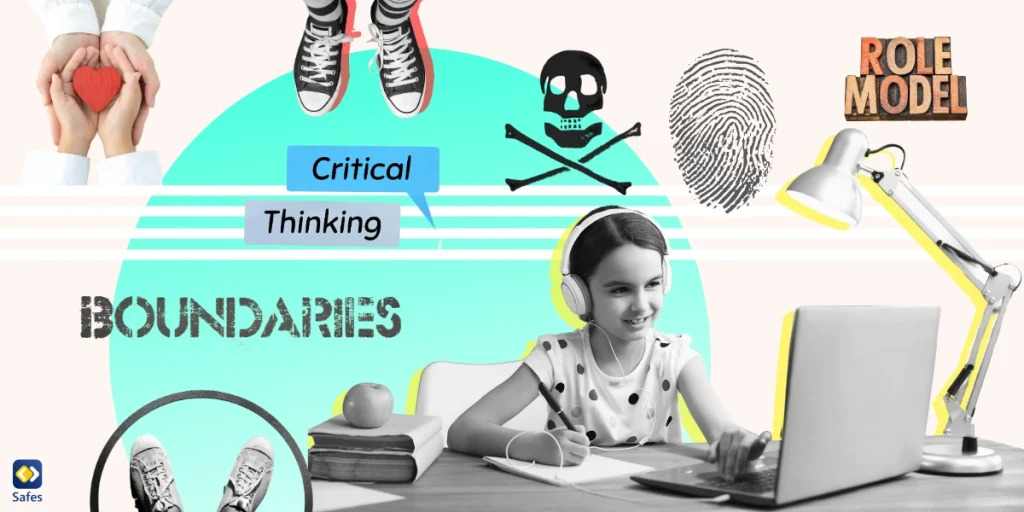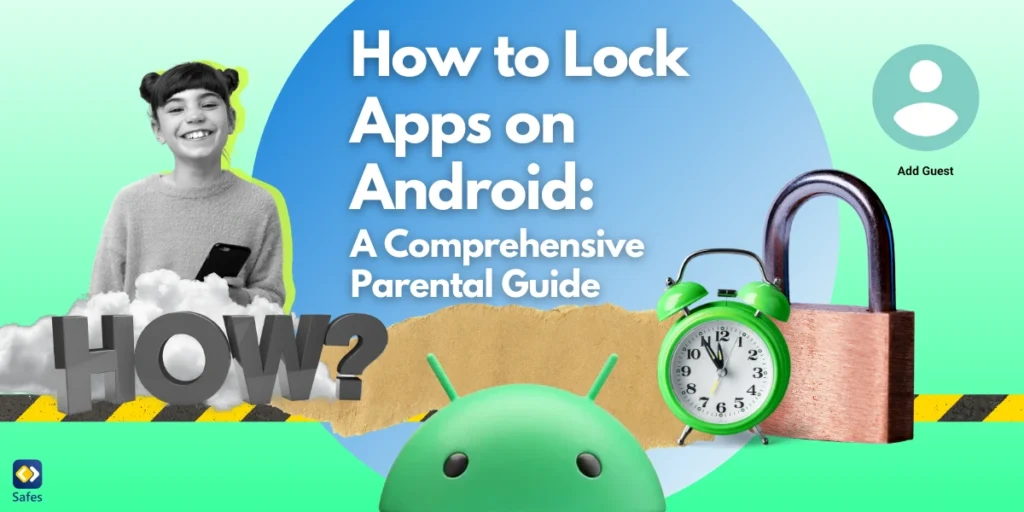As teenagers step into the dating scene, parents find themselves charting unfamiliar territories. The concept of kids dating can bring mixed feelings and concerns. It’s essential for parents to understand that this is a natural part of growing up, and managing it effectively starts with accepting its inevitability.
Download and Start Your Free Trial of the Safes Parental Control App
The role of parental guidance cannot be overstated when it comes to dating for teens. A key component is maintaining open communication. Encouraging fun, social activities can be a great way for teens to interact in a fun, safe environment, while also allowing parents to subtly keep a guiding hand in their teenager’s social life.
Understanding Teen Dating Today
Dating for teens has transformed drastically with the advent of technology. Social media and dating apps have reshaped the way young people connect and form relationships. Platforms like Tinder raise questions like “Is Tinder safe?” among concerned parents, as these apps have become a common method for teens to meet potential partners.
Teens spend a lot of time on social media, which significantly influences their perceptions of dating and relationships. This constant exposure can create unrealistic expectations about what a boyfriend or girlfriend should be like, heavily influenced by the highlight reels of others’ lives.
Group dates, once a staple of teenage social life, now often start in digital spaces before moving into the real world. This shift means that many initial interactions occur behind screens, with plans often made via group chats or responses to social media posts, blending the lines between public and private courtship.
Also, the influence of the media on teen dating cannot be understated. From romantic movies to dating ads on social media, the media crafts a narrative that can dictate how teens think they should behave in relationships. Understanding this can help parents guide their teens through the complex world of modern dating.

Signs Your Teen Might Be Ready to Date
Determining whether your teen is emotionally ready to date involves assessing their maturity level. It’s about observing how they manage emotions during conflicts or stressful situations. This readiness is crucial as it dictates how they handle the emotional dynamics of dating.
While there’s no one-size-fits-all answer to “what is the appropriate age to date,” a good guideline is to consider whether your teen shows consistent maturity in their actions and decisions. This is more indicative of readiness than age alone.
Furthermore, evaluating your teen’s ability to handle responsibilities can offer insights into their readiness for dating. If they are managing their schoolwork, household chores, and personal commitments well, it might be a good idea to support their interest in dating.
Don’t forget that peer pressure can significantly influence a teen’s decision to start dating. It’s important to discuss with your teen how much of their interest in dating is influenced by wanting to fit in versus genuine interest in starting a relationship.
Setting Ground Rules
When guiding teens into the dating world, one of the most critical aspects is establishing boundaries. Here’s how you can set these effectively:
- Importance of Clear Boundaries: In teen dating, setting clear, fair, and consistent boundaries is crucial for safeguarding young people as they navigate romantic relationships. Clear rules help teens understand expectations and the framework within which they can safely explore their feelings and relationships.
- Implementing a Curfew: A curfew is a fundamental rule that serves multiple purposes in the context of teen dating. It ensures your teen is safe at home at a reasonable hour and helps instill a sense of responsibility and time management when balancing social and family life.
- Encouraging Age-Appropriate Behaviors: It’s important to discuss and enforce age-appropriate behaviors. This includes respectful interactions with a boyfriend or girlfriend and understanding the boundaries of acceptable public and private behavior. These guidelines help teens build healthy, respectful romantic relationships.
- Ground Rules for Digital Communication: Digital communication is a huge part of teen dating today. Setting ground rules about texting, social media use, and online privacy is essential. This might include restrictions on sharing passwords, keeping certain conversations off social media, and respectful online interactions.
Communicating About Dating
According to Psychology Today, initiating discussions about dating with your teenager can be approached by asking open-ended questions that encourage them to share their feelings and expectations about dating. This helps gauging their readiness and makes them feel valued in the conversation. It’s important to ask about their interest in someone and what they admire about them to naturally steer into the topic of dating.
Values like respect and consent are crucial in dating and should be discussed explicitly. Explain the importance of respecting both their own boundaries and those of others. Emphasize that consent must be clear and ongoing throughout any relationship.
Also, discussing the importance of honesty and trust within a relationship can help set expectations for their dating experiences. Stress that being honest about their feelings and expectations forms the foundation of a healthy relationship, and trust is built through consistent and reliable actions and words.
It’s also essential to discuss personal and emotional safety, outlining that feeling safe with the person they are dating is non-negotiable. Encourage them to listen to their instincts and speak up if they ever feel uncomfortable or unsafe.
When discussing relationships and dating, it’s important to use inclusive language that respects their identity and does not assume a specific sexual orientation. This not only shows respect for their identity but also opens up a space where they can feel comfortable discussing their feelings and experiences.
Through these discussions, you not only educate your teenager about the critical aspects of dating but also strengthen your relationship with them by establishing a dialogue that is based on mutual respect, trust, and understanding.
Open Conversations on Sexual Health
Discussing sexual health and safety with young people is essential. It’s crucial to approach these discussions openly and honestly, ensuring that teenagers understand the importance of their health and well-being in the context of sexual activity. Creating a comfortable environment for these talks increases their effectiveness.
Consent is a critical topic that must be addressed face to face. Explain to your teen that consent must be clear, enthusiastic, and ongoing. Stress that it is non-negotiable and essential in all interactions. This understanding is vital for fostering respect and safety in any relationship.
Safe sex practices are another vital discussion. Emphasize the use of protection, the role of vaccinations, and regular health check-ups. Encourage your child to ask questions, and make sure they feel informed and prepared. Paying attention to these details can prevent health issues and promote responsible behaviors.
Provide your teenager with resources for further education and support. This includes books, credible websites, and even contact information for local health clinics. These resources can help them learn more about sexual health and obtain guidance when needed, making them feel more secure and informed.
Keep the lines of communication open. Encourage your teen to come to you with questions or concerns at any time. Regular check-ins can reinforce the importance of these topics and ensure that your teen feels supported as they navigate their sexual health and relationships.
Monitoring and Supporting Your Teen’s Dating Life
Balancing supervision and privacy in your teen’s dating life is crucial. It’s important to monitor for signs of challenges, such as teen dating violence, while respecting their need for independence. This balancing act helps maintain healthy relationships and ensures that your teen feels trusted and valued, not policed.
Regular check-ins are a non-intrusive way to stay informed about your teen’s dating experiences. These should be casual yet sincere, fostering an environment where they can share freely. This technique supports them in navigating dating safely and responsibly.
Being approachable and non-judgmental is key to staying connected with your teen. If they view you as a confidant, they’re more likely to discuss their feelings and experiences openly. This openness is vital for guidance and support as they explore romantic relationships.
Furthermore, encourage your teen to engage in safe, public date activities like going to an amusement park. This not only ensures safety but also keeps the dating experience fun and light-hearted. Activities in public spaces can ease parental concerns and are conducive to healthy social interactions.

Handling Breakups and Heartbreak
Supporting your teen through a breakup involves compassionate listening and gentle guidance. Encourage them to express their feelings without judgment, validating their emotions as part of the healing process. Breakups in teenage relationships can be profoundly impactful, making empathetic support essential.
Be vigilant for signs of emotional distress following teenage breakups. Symptoms can include withdrawal from social activities, persistent sadness, or changes in sleeping and eating habits. Recognizing these signs early can help prevent longer-term psychological effects from an unhealthy relationship.
If distress signs persist or worsen, consider seeking professional help. A counselor or therapist can provide your teen with strategies to manage their emotions healthily and constructively. This step is crucial if the relationship exhibited signs of being unhealthy, as professional intervention can offer tailored support and recovery guidance.
Embrace Modern Tools!
In today’s digital age, using a parental control app like Safes can be a crucial step in overseeing your teenager’s online interactions, especially in the context of dating. This app, designed for both iOS and Android platforms, provides parents with tools much more sophisticated than iPhone parental controls to monitor communications discreetly, ensuring their teen’s dating experiences are positive and safe. For example, you can ban certain apps, such as the not-suitable-for-teens Tinder or limit your teen’s social media usage to times you can supervise them.
We encourage parents to get hands-on experience with Safes by trying out our free trial. This trial offers a practical insight into how Safes can be utilized to protect and guide teenagers during their dating adventures.
Moving Forward Together
Throughout this discussion, we’ve emphasized the importance of open communication, understanding, and supervision in the realm of teenage dating. Using tools like parental control apps can help monitor interactions while respecting your teen’s need for privacy and independence, ensuring they experience healthy relationships.
Encouraging an open dialogue about dating is crucial for helping your teen navigate their relationships responsibly. Be proactive in discussing topics like consent, emotional safety, and the digital aspect of relationships today. By being supportive yet vigilant, you can guide your teen towards making wise and respectful dating choices.
Your Child’s Online Safety Starts Here
Every parent today needs a solution to manage screen time and keep their child safe online.
Without the right tools, digital risks and excessive screen time can impact children's well-being. Safes helps parents set healthy boundaries, monitor activity, and protect kids from online dangers—all with an easy-to-use app.
Take control of your child’s digital world. Learn more about Safes or download the app to start your free trial today!




